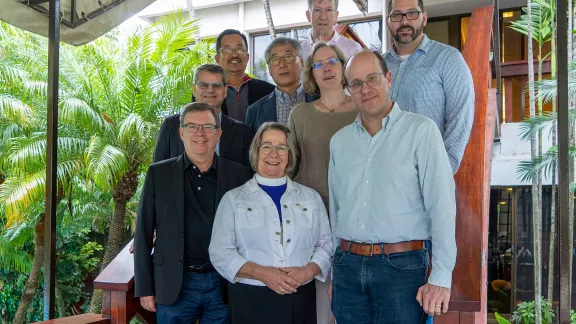Promoting deeper communion and closer cooperation between Anglicans and Lutherans: that’s the goal of identifying pairs of bishops who can lead the work of promoting mission-focused ecumenical relationships in countries around the world.

Members of the ALICUM Steering Group gathered in San José, Costa Rica. Photo: ACO/N. Vigers
Anglican-Lutheran International Commission on Unity and Mission meets in Costa Rica to discuss shared mission
(LWI) - Leaders of the Lutheran World Federation (LWF) and the Anglican Communion have been meeting to promote closer relationships between their two communions in countries across the globe. The 6 to 10 March meeting in San José, Costa Rica, of the Steering Group of the Anglican-Lutheran International Commission on Unity and Mission (ALICUM) marked the first in-person gathering since the group was established in 2018.
A key task of the Commission is to identity and support regional or national pairings of Anglican and Lutheran bishops or other church leaders who can work together to implement the many consensus statements between the two communions and further ecumenical collaboration. In some parts of Europe and North America, formal full-communion agreements exist between the two churches. Yet, as Prof. Dirk Lange, LWF’s Assistant General Secretary for Ecumenical Relations notes: “The Steering Group also affirmed the “close relationships between Anglicans and Lutherans in many areas of the world where no formal agreement exists and asked how this witness can open new understandings of unity.”
Reflecting on the “contextual complexities” within which the two churches seek to “live out their ministry and mission,” participants discussed the question of holding together the more doctrinal (Faith and Order) and more practical (Life and Work) aspects of their relationship. They noted that “the dominant focus has often been from doctrine to mission, but that this is not the reality of the churches’ life in many regions. Mission informs and shapes doctrine,” they affirmed, “just as doctrine informs and shapes mission.”
The Commission “encourages local churches to explore the value of formal bilateral agreements in their context.
– Communique from the Steering Group of the Anglican-Lutheran International Commission on Unity and Mission (ALICUM)
While recognizing that “there is much that our churches can achieve together without full doctrinal consensus,” the Commission nevertheless “encourages local churches to explore the value of formal bilateral agreements in their context.” The meeting in Costa Rica heard reports on relationships between the two churches in different parts of the globe, in particular in North America, Germany, Singapore and South Korea.
The Commission will be approaching pairs of church leaders throughout this year, with the goal of them beginning a new stage of shared work in 2024. An in-person meeting of all these pairs, together with the Steering Group, is planned for March 2025, followed by a summit to complete the work of ALICUM’s first phase in 2028.
Participants at the meeting visited the Episcopal Day Care Centre of the local church in Costa Rica which provides vital facilities and support for over 200 children, including many from very deprived backgrounds. The group also visited the Episcopal Cathedral of the Good Shephard which stands on the site of the country’s first Protestant chapel. Known as the ‘Iron Chapel’, it was built in 1865 for an ecumenical congregation, where Anglicans, Congregationalists, Lutherans, Methodists and Presbyterians worshiped together in what Commission members described as “a vivid witness to the kind of mission-focused ecumenical relationships ALICUM is seeking to promote.”


